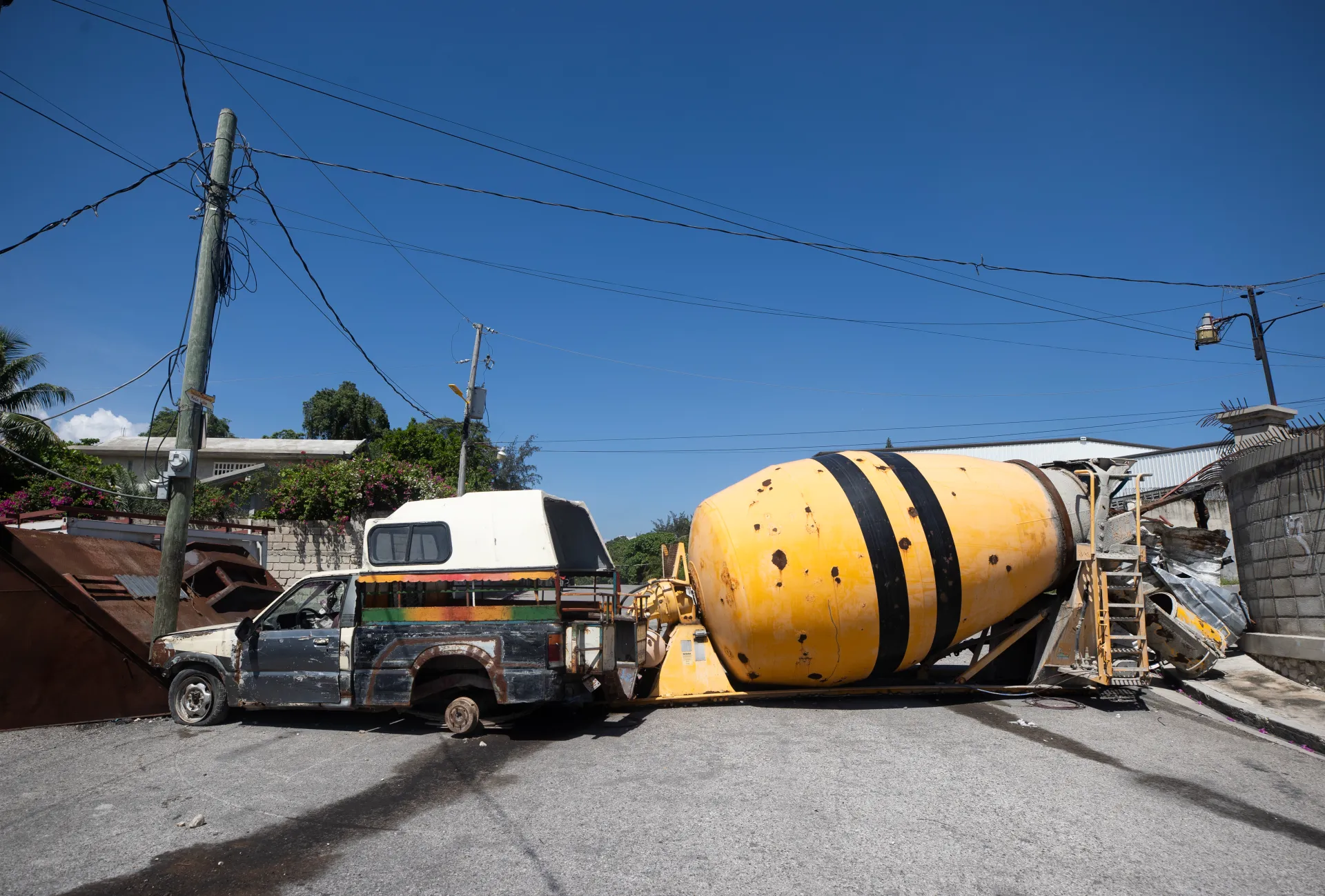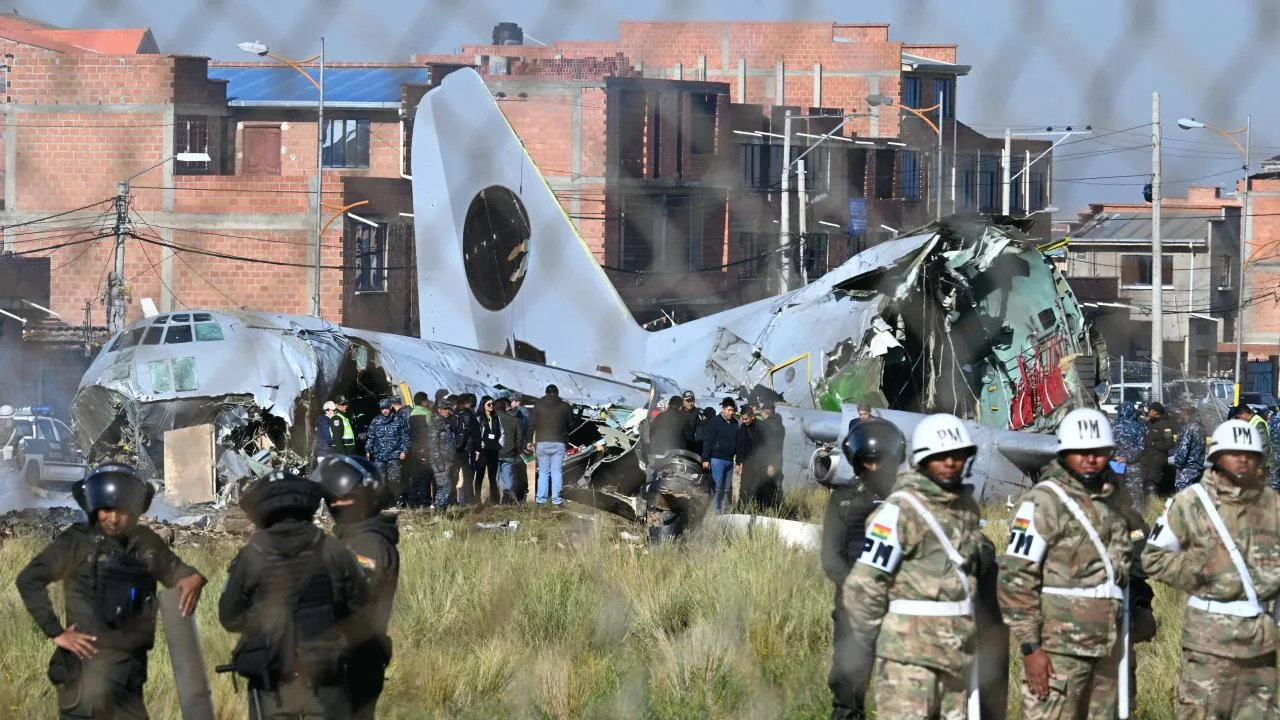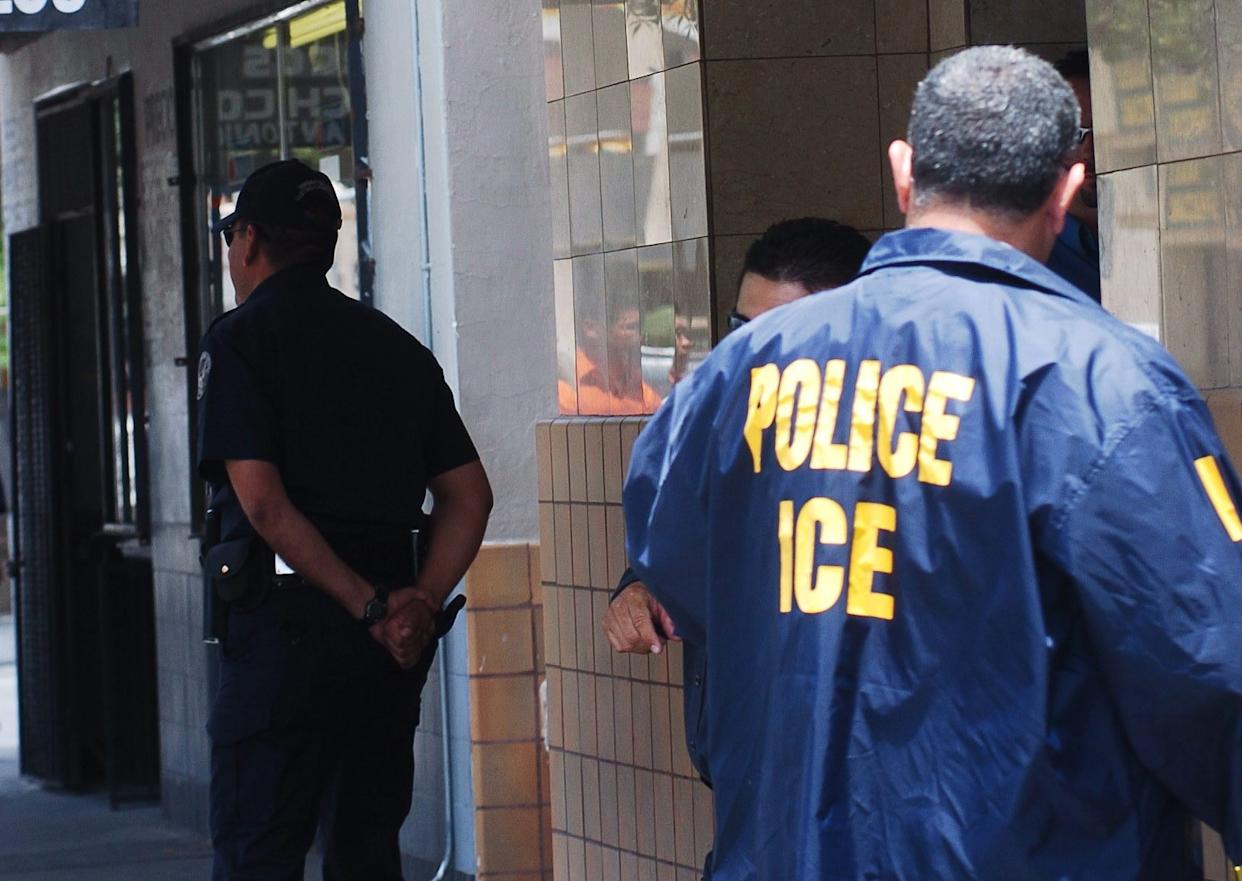International
Neighbors block streets in Port-au-Prince to protect themselves and prevent the entry of gangs

Many streets of Port-au-Prince are blocked with cars and trucks, with all kinds of objects that neighbors place to prevent the entry of armed gangs into their neighborhoods.
This is the situation that EFE found in the capital areas of Delmas 31 and Delmas 33, where the president of a neighborhood board, James Polimo, explained that it is the way they have to “self-protect” from gang violence, their attacks, killings, rapes and kidnappings.
According to Polimo to EFE, although in his neighborhood as such there are no gangs nearby, they are protected because recently members of armed groups tried to kidnap a person who works in the area.
The inhabitants, when they realized, had to cut the streets “so that they didn’t fall on him.”
Those blockages give the neighbors a greater sense of security and, he added, “although they are not one hundred percent protected, they feel safer than on the other side of the barrier.”
“Here 50 percent can sleep at night because they feel protected,” Polimo said in the face of extreme insecurity in the metropolitan area of Port-au-Prince, largely under the control of gangs and in the midst of violence that has forced thousands of people to leave their homes and become displaced people within the city or to flee to other areas of the country or abroad.
Despite the difficulties that the cutting of streets entails for the neighbors when it comes to accessing the neighborhood, they don’t care because “when they enter, they feel safer than outside.”
He added that, if a member of the gangs decided to enter his neighborhood, “he could not be there for more than three minutes because the neighbors would catch him.”
When asked about how he sees the next deployment of the multinational security support mission, led by Kenya and approved by the UN, Polimo assured that it will be welcome, but considers that “the problem of Haiti is the same Haitians, who have to be together to be able to give security to the country and solve the problems.”
In his opinion, international troops come to Haiti to protect the country, but “we are the ones who have to stand ahead” when it comes to resolving the situation.
In early May, the Minister of Foreign Affairs of the Bahamas, Fred Mitchell, whose country will also send troops to Haiti, announced that the deployment of the multinational mission to restore security would begin on the 26th of this month.
Biden received Kenyan President William Ruto, on Thursday at the White House, and in fact raised the level of the bilateral alliance by designating the African country as a ‘main ally outside NATO’ for its leadership in that mission that will be deployed in Haiti.
At a press conference, Biden promised logistical support to the multinational security mission, but reiterated that the United States will not send soldiers to Haiti.
For the deployment of that force, which will be composed of about 2,500 members from countries from different continents, the Biden Administration committed 300 million dollars and calculated that the mission will have an annual cost of between 500 and 600 million, so it has pressured its allies to make more contributions.
The political, social and economic crisis and the escalation of violence have resulted in numerous changes in Haiti, with consequences such as Henry’s resignation and the creation of a Transitional Presidential Council, which should lead to the holding of presidential elections.
Last year alone, the violence caused 8,000 victims in Haiti, where the gangs control much of Port-au-Prince and other areas of the country.
International
Bolivia Orders Three Investigations Into Deadly Military Plane Crash

Bolivia’s Defense Minister Marcelo Salinas announced Monday that three separate investigations will be conducted into Friday’s crash of a military cargo aircraft at El Alto International Airport, near La Paz, which left at least 22 people dead.
The Hercules aircraft, operated by the Fuerza Aérea Boliviana (FAB), was transporting cash intended for the Central Bank of Bolivia when it overshot the runway after landing from the city of Santa Cruz. The plane reportedly traveled nearly one kilometer beyond the airport perimeter.
The incident sparked chaotic scenes, with individuals attempting to collect scattered banknotes. Authorities detained 51 people in the aftermath, and the government declared three days of national mourning.
Multiple Investigations Underway
The first inquiry is being led by a military board from the Bolivian Air Force, which has already taken custody of the aircraft’s black box for analysis.
Minister Salinas said two additional investigations will follow — one conducted by the insurance company and another by the aircraft’s manufacturer.
“At least two more investigations will come, that of the insurance company and that of the aircraft manufacturer,” Salinas said during a press conference in Santa Cruz.
He cautioned that the investigative process could take between three and six months, noting that the black box cannot be opened in Bolivia due to the lack of specialized laboratories for analysis.
Awaiting Official Findings
Salinas stressed that the FAB investigative board is the highest authority in the case and urged the public to wait for its conclusions to avoid speculation about the causes of the crash.
He also confirmed that the government has contacted the families of the 22 victims and the 37 injured, as well as the owners of 15 damaged vehicles, to coordinate procedures with the insurer and cover the corresponding expenses.
International
Mexico Calls for Immediate Probe After National Dies in ICE Custody

Mexico’s Secretaría de Relaciones Exteriores (SRE) on Monday called on U.S. authorities to conduct an “immediate and thorough” investigation into the death of a Mexican national while in custody of U.S. Immigration and Customs Enforcement (ICE) at a processing facility in California.
In a statement, the Mexican government described the death as “regrettable” and urged U.S. officials to clarify the circumstances surrounding the case in order to “determine responsibilities and ensure that such events do not happen again.”
Death at Adelanto Processing Center
According to available information, the Mexican citizen died at the Adelanto Processing Center in California while under ICE custody. Authorities have not yet released the individual’s identity or the cause of death.
Following the incident, Mexico’s Foreign Ministry formally requested “detailed information” from U.S. authorities, including the detainee’s medical records and custody reports.
Consular Assistance Activated
The Mexican Consulate in San Bernardino, California, has activated consular assistance protocols to provide ongoing support to the deceased’s family. Officials have contacted relatives to express condolences and offer legal guidance, as well as assistance with the necessary procedures to repatriate the remains.
“The handling of situations like this and the establishment of mechanisms to resolve them are priorities for the Government of Mexico,” the Foreign Ministry said, adding that it will formally request an investigation into any systemic conditions that may have contributed to such incidents.
Local Mexican media reported that seven Mexican nationals died while in ICE detention last year — the highest number recorded since the agency was created.
International
Anti-ICE Billboard Campaign Targets Immigration Spending in 31 U.S. Cities

More than 200 billboards criticizing U.S. Immigration and Customs Enforcement (ICE) began appearing Monday in 31 cities across the United States, including Miami, as part of a campaign highlighting the high cost of immigration enforcement operations for taxpayers.
The initiative, titled “ICE Costs Us,” was launched by the civil rights organization Mijente and will run for four weeks.
Criticism of Spending and Enforcement Tactics
The billboards feature images of ICE agents during arrests or carrying military-style weapons. According to the organization, spending on military-grade equipment for the agency has increased by 600 percent in recent years.
Several signs display messages such as:
“Your taxes are being wasted” and “ICE’s cruelty costs you $28 billion,” referring to the agency’s annual budget.
In a statement, Marisa Franco, co-founder of the Mijente Support Committee, said:
“For too long, our government has prioritized building cages and investing billions in an immigration enforcement apparatus that has left families torn apart and communities terrified.”
She added that “Millions of Americans are living paycheck to paycheck, yet this violent agency continues operating with a blank check. These decisions do not make us safer nor improve our economic security. Our billboards highlight these choices and demand a different path.”
Budget Debate and Medicaid Comparison
The campaign also draws a comparison between ICE’s funding and the estimated 17 million people who could lose health coverage under Medicaid due to federal budget cuts under President Donald Trump.
Other billboard messages seen in various cities include:
“They get billions to beat us; we get layoffs and rising rents” and “Funding ICE is a fast track to fascism.”
Organizers say the goal is to spark public debate about the allocation of federal funds for immigration enforcement and the broader economic and social impact of such policies on communities nationwide.
-

 International2 days ago
International2 days agoIran Reports 201 Dead, 747 Injured After U.S. and Israeli Strikes
-

 International5 days ago
International5 days agoCocaine Production Surges 34% in 2023 as Market Expands into Africa and Asia
-

 International4 days ago
International4 days agoTrump Floats “Friendly Takeover” of Cuba Amid Rising Tensions
-

 Sin categoría3 days ago
Sin categoría3 days agoTrump: ‘We Think It’s True’ Amid Claims Iran’s Supreme Leader Was Killed
-

 International3 days ago
International3 days agoSecurity Council to Hold Emergency Meeting on Middle East Crisis
-

 International2 days ago
International2 days agoPope Leo XIV Urges End to ‘Spiral of Violence’ in Middle East
-

 International5 days ago
International5 days agoFederal Judge Blocks Trump Policy Allowing Deportations to Third Countries
-

 International4 days ago
International4 days agoArgentina’s Senate Reviews Milei-Backed Labor Overhaul
-

 International17 hours ago
International17 hours agoBrazil’s Supreme Court Rejects Bolsonaro’s Bid for House Arrest
-

 International5 days ago
International5 days agoClinton Accuses Republican Committee of Using Epstein Case to Shield Trump
-

 International17 hours ago
International17 hours agoAnti-ICE Billboard Campaign Targets Immigration Spending in 31 U.S. Cities
-

 International17 hours ago
International17 hours agoTrump Warns of ‘Major Wave’ of Attacks as Iran Conflict Escalates
-

 International17 hours ago
International17 hours agoMexico Calls for Immediate Probe After National Dies in ICE Custody
-

 Central America17 hours ago
Central America17 hours agoPanama Canal Monitoring Trade as Middle East Conflict Disrupts Shipping
-

 International17 hours ago
International17 hours agoBolivia Orders Three Investigations Into Deadly Military Plane Crash




























